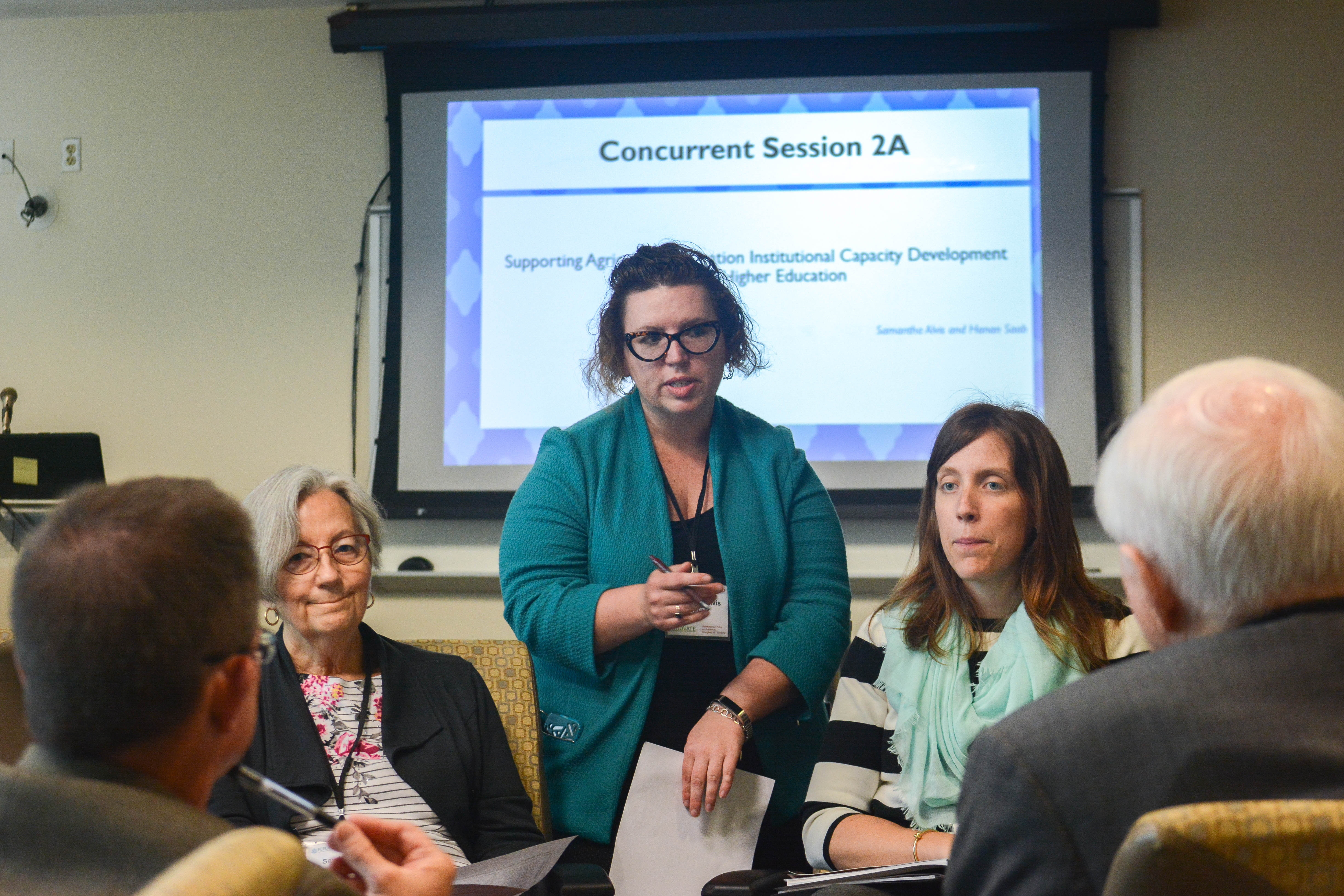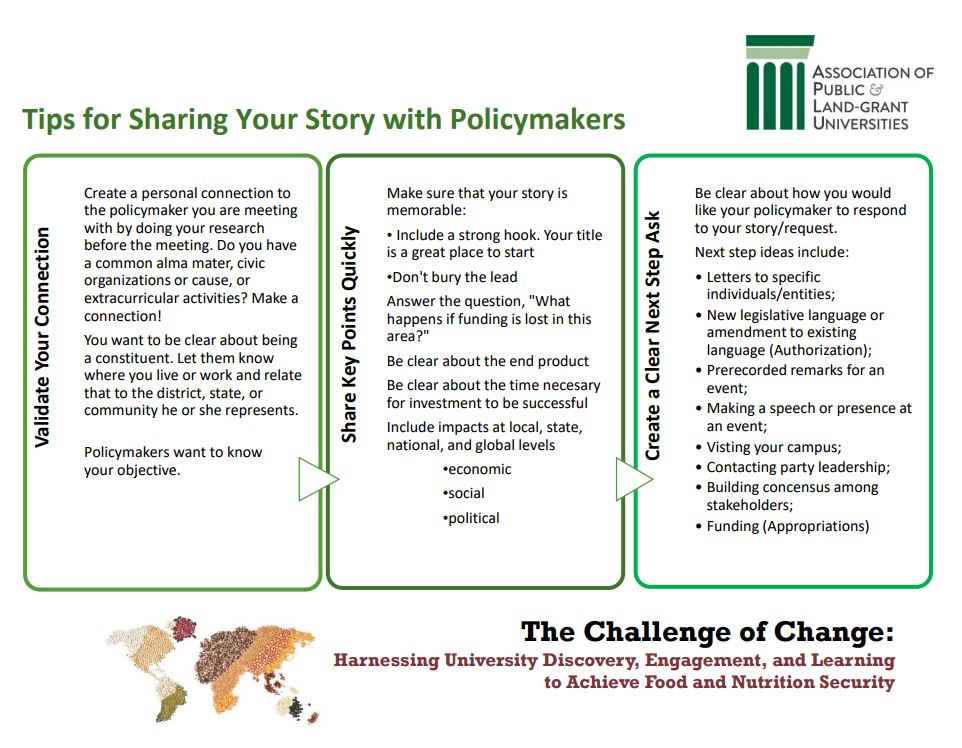Agricultural education is a vital building block to developing well-trained human capital with contextually-relevant and globally-competitive knowledge and skills. Policymakers need to understand the importance of agricultural education, but how do you effectively tell the story of agricultural education in a way that compels them to act?
Arranging a meeting is a common way to connect with policy makers in many countries. In many cases, the person you meet face-to-face with is not the policy maker themself, but rather a member of their staff. This can seem disappointing, but your voice still can be heard by using the meeting time wisely to share why agricultural education is important to you, and why it should also be important to them.
It’s important in these meetings to come prepared. This is your opportunity to spotlight your program, campus, or investment. Think about what story you want to tell the policy maker, and come prepared with materials!

Samantha Alvis from the American Public Land Grant Association facilitates a conversation during her session.
Validate Your Connection
When approaching policy makers to discuss agricultural education, the first step is to validate your connection. Be clear that you are a constituent by letting them know where you live or work, and how you relate to the area he or she represents.
Finding an area of common ground is also a way to build a connection with a policy maker. Do you have a common alma mater, civic organization, or extracurricular activities? Mentioning one such connection is a way to get the conversation started and emphasize the idea that you already share a connection.
Finally, it is important to clearly state your objective for visiting with the policy maker. Your pitch should be concise and connected to a specific action that the policy maker can make. Work to build a relationship with the policymaker or their staff by scheduling visits for different purposes. These could include just informational visits, or invitations to visit your campus or project. Of course, official language through legislation or policy and funding are often two top priorities for a visit.
Share Key Points Quickly
You may only have a few minutes with the policy maker so it is important to have your points planned in advance. Policy makers and their staffers meet with many people in a single day, so it is helpful to make your points memorable by couching them into a story. Many policy makers like to tell stories while campaigning, so a good story has the possibility of being repeated for wider impact.
When crafting your agricultural education story, make sure it is memorable! A great way to do this is through a leave-behind, i.e. handout. For example, in APLU’s recent Challenge of Change report, there are a number of 1-page vignettes that can be pulled from the report, depending on the state/office visited, that spotlight the work of a specific institution (we really like the Better Bread* story on Page 107). In your stories, include a strong hook, and the title is a great place to start. Clearly state how the story relates to your objective – in other words, don’t bury the lead. Answer the question, “What happens if funding is lost in this area?” Finally, make sure to emphasize economic, social and political impacts at the local, state, national and global levels.
Create a Clear Next Step
To wrap up the meeting, leave the policy maker with a clear action that they can take in order to support agricultural education.
Depending on the timing of your meeting and request, action items could include:
- Letters to specific individuals or entities
- New legislative language or amendment to existing language
- Prerecorded remarks for an event
- Visiting your campus
- Contacting party leaders
- Building a consensus among stakeholders
- Funding
Clearly state how taking action will support your objective and relate to the story you told. Finish the meeting by summarizing your major points, and answering any questions. Conclude the meeting by leaving promptly. Follow up by sending a brief thank-you letter, and any follow-up information that you offered to provide.
Taking the time to meet with policymakers to express the importance of agricultural education, or any cause, is a great way to build a base of support for agricultural education. Although it might seem intimidating, engaging policy makers is a direct opportunity to influence policy and legislation at the local, state, national and global levels.
*Why do we like the Better Bread story?
- For a U.S. audience, it’s easily relatable–most people eat bread!
- The title is catchy
- This particular story shows how international research and investments can have an impact domestically

Melanie Miller Foster is an Assistant Professor of International Agriculture at the Pennsylvania State University. Melanie is an enthusiastic team member of Global Teach Ag! Initiative at Pennsylvania State University and the USAID-funded Innovation for Agricultural Training and Education (InnovATE) project. She served as a facilitator for Samantha and Hanan’s session at the InnovATE symposium.
Samantha Alvis is the Director of International Development and Programs for the Association of Public and Land-grant Universities (APLU). She oversees a number of projects and initiatives related to the comprehensive internationalization of APLU member campuses. She also manages APLU’s International Agriculture Section.
Hanan Saab is the Assistant Director for International Issues within the Office of Congressional & Governmental Affairs of the Association of Public and Land-grant Universities (APLU). In this role she leads the association’s advocacy on higher education issues related to immigration and visa policy, study abroad, international education, international agriculture and international development.

